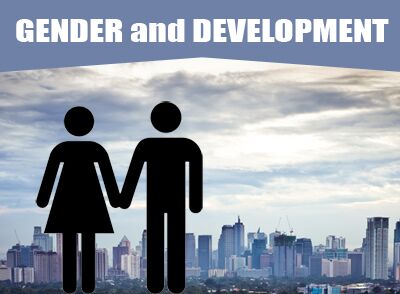
Both women and men play important roles in development. The global consensus is that development objectives should promote gender equality. Women should have the same access to education, health, and other social services; can freely participate in the political processes; and have the same economic opportunities as men. Gender gaps in economic, social, and political opportunities still remain, however, that limit women’s socioeconomic advancement and full participation in the development process. Recently, the Philippines gained global recognition for addressing gender gaps. In the latest Gender Gap Report of the World Economic Forum, the country rose by three notches to fifth in the global ranking due to some improvements in economic participation and opportunity. The Philippines also topped all lower-middle income countries as well as the Asia-Pacific region. “[The] Philippines is the only country in Asia and the Pacific that has fully closed the gender gap in both education and health,” the 2013 report said.
Still, critical issues remain. Maternal health remains a challenge in the Philippines’ commitment to meet the Millennium Development Goals. PIDS research has found evidence of inequality in maternal and child health services utilization across economic classes and across regions, which requires government intervention. Gaps also emerge when gender issues intersect with the need to provide opportunities to certain sectors such as persons with disabilities (PWDs). For PWDs, data show that more women are unable to complete any grade in school, and the disparity is wider in rural areas. Among PWDs, women are also left out in terms of employment.
Studies by PIDS have also shed some light on other gender and development issues, especially with respect to the analysis of gender-disaggregated data. Resident fiscal expert Dr. Rosario Manasan argues that budget analysis must be informed by gender analysis. While there is no gender bias in the formal policies and procedures that govern the delivery of services of various government agencies, gender bias might result from informal rules, attitudes, and behavior not only of service providers but also of the target clientele. Consultation mechanisms are thus important.
You may access these and other PIDS studies on women and gender and development using the SocioEconomic Research Portal for the Philippines . Simply type the relevant keywords in our Search box.
Disability and Gender: The Case of the Philippines
Are There Regional Variations in the Utilization of Maternal and Child Care Services Across Income Groups?
Are Maternal and Child Care Programs Reaching the Poorest Regions in the Philippines?
Gender-Responsive Budgeting through the CBMS Lens
Gender-Differentiated Benefit Incidence of the Department of Education: Basic Education for All?
Looking Closely on Who Benefits from Public Subsidies in Health Care: A Gender Perspective
Integrating Gender Perspectives in Evaluating the Efficiency of COFI: The Case of Credit Cooperatives in the Philippines
The Impact of Fiscal Restraint on Budgetary Allocations for Women’s Programs
Still, critical issues remain. Maternal health remains a challenge in the Philippines’ commitment to meet the Millennium Development Goals. PIDS research has found evidence of inequality in maternal and child health services utilization across economic classes and across regions, which requires government intervention. Gaps also emerge when gender issues intersect with the need to provide opportunities to certain sectors such as persons with disabilities (PWDs). For PWDs, data show that more women are unable to complete any grade in school, and the disparity is wider in rural areas. Among PWDs, women are also left out in terms of employment.
Studies by PIDS have also shed some light on other gender and development issues, especially with respect to the analysis of gender-disaggregated data. Resident fiscal expert Dr. Rosario Manasan argues that budget analysis must be informed by gender analysis. While there is no gender bias in the formal policies and procedures that govern the delivery of services of various government agencies, gender bias might result from informal rules, attitudes, and behavior not only of service providers but also of the target clientele. Consultation mechanisms are thus important.
You may access these and other PIDS studies on women and gender and development using the SocioEconomic Research Portal for the Philippines . Simply type the relevant keywords in our Search box.
Disability and Gender: The Case of the Philippines
Are There Regional Variations in the Utilization of Maternal and Child Care Services Across Income Groups?
Are Maternal and Child Care Programs Reaching the Poorest Regions in the Philippines?
Gender-Responsive Budgeting through the CBMS Lens
Gender-Differentiated Benefit Incidence of the Department of Education: Basic Education for All?
Looking Closely on Who Benefits from Public Subsidies in Health Care: A Gender Perspective
Integrating Gender Perspectives in Evaluating the Efficiency of COFI: The Case of Credit Cooperatives in the Philippines
The Impact of Fiscal Restraint on Budgetary Allocations for Women’s Programs












